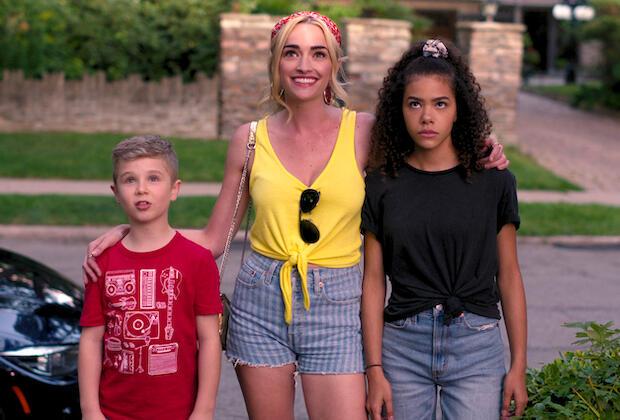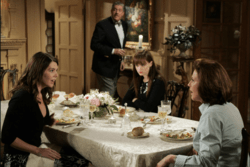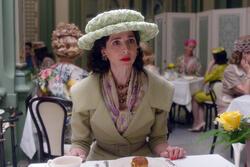"Ginny and Georgia": A Jewish Feminist Take
I’ve enjoyed my fair share of vapid TV shows. I loved the Netflix reality show Too Hot Too Handle, and I watched the whole Bridgerton series in one day. But the Netflix show Ginny and Georgia takes this type of TV to a new low. Most episodes had me cringing and yelling at the screen out of secondhand embarrassment. Outside of the show's major cringe factor, however, it raised significant questions for me as a Jewish feminist. And given its recent renewal for a second season, I think these questions are worth engaging.
Ginny and Georgia revolves around high school teens and somehow also murder and money laundering. The titular characters Georgia and her daughter Ginny move to a new town and try to fit in, but Georgia’s past follows her. The writers cover the usual list of coming-of-age tropes: partying, experimenting with drugs and alcohol, and new relationships. Along with these fairly formulaic plot elements, the writers throw in an entire subplot about Georgia’s dark past, complete with murder, underground gambling rings, and motorcycle gangs. The show attempts to check a lot of boxes in terms of genre, but it also bizarrely tries to check off a lot of boxes in terms of…types of oppression?
The show touches on relevant cultural topics like racism, the struggles of gay and lesbian characters, body dysmorphia, self-harm, and more. Some of the show's plotlines seem well thought-out and intentionally included, like a family who uses sign language to communicate with their deaf father (though some noted frustration with inaccurate signing by non-deaf actors). On the other hand, the show fails in its discussion of Ginny’s biracial identity and the racist microaggressions that she faces. The show includes a plotline about oppression olympics between Ginny and her boyfriend (who is white and Taiwanese), that incorporates the model minority myth. Most of the other scenes addressing contemporary societal issues included in the show seem similarly haphazard.
While virtually all the representation included in the show falls short, the Jewish representation (or lackthereof) particularly stood out to me. Possibly in another attempt to check off every diversity box, there are two Jewish characters. Yet, a scene only mentions that two of Ginny’s friends are Jewish to justify a short conversation about bat mitzvahs. I find this type of Jewish representation to be inauthentic and superficial—it portrays being Jewish as a fun fact about a person, rather than a complex and significant identity. As a Jewish woman, having my identity reduced to a bat mitzvah joke doesn’t make me feel seen or included.
While there seems to be absolutely no intentional or deeper meaning behind this scene, I have to wonder if it does represent a more complex modern Jewish American dilemma: Does this reduction of Jewish identity to a brief conversational anecdote portray the success of Jewish American assimilation? Or, alternatively, does it represent an American public that fundamentally misunderstands Jewish identity? Given the scene’s disconnect from contemporary Jewish conversations, the latter seems more likely.
My frustration deepens in the next few minutes of the scene, when Ginny reacts with surprise to learn that her friend Norah is Jewish as well as Asian. This could have been an educational moment for the show’s viewers, consistent with the American Jewish community’s recent “awakening” to the experiences of Jews with intersecting identities and the treatment of Jews of color. It could have added to the conversation regarding the racial diversity of Jews and the Jewish experience, but the dialogue immediately moves past this revelation, and it’s never mentioned again. It’s possible that Ginny and Georgia’s inclusion of a Jewish and Asian character might help expose non-Jews to the diversity of the Jewish community; however, it seems unlikely that this will truly register without any further development by the show’s writers.
The show’s superficiality in regards to Jewish identity reflects a bigger issue in Hollywood than simply making young Jewish girls not feel particularly represented. This show reflects a pattern in TV shows that mention Jews: either the Jewish people are connected to Judaism through religion but feel repressed and must escape (for example, Unorthodox), or the character’s Jewish identity is a joke (see Parks and Recreation or Ginny and Georgia). In many cases, Jewish characters and jokes are written by Jews. But the fact that the same sorts of Jewish connections and experiences are the ones being consistently elevated represents a society that sees Jewish people in a very narrow light: one that isn’t particularly nuanced, varied, or positive. Jews love "Jewish humor"; but being consistently told that you are the butt of a joke can negatively affect the way American Jews see ourselves.
The show’s coverage of feminism suffers from similar issues. While the show has many contradictions when it comes to feminism (feminism is supposedly an important part of Ginny’s identity, yet she repeatedly slut-shames her mother), the show’s most confusing “feminist” commentary surrounds ideas of women and power. In one voiceover sequence, Georgia says, “We live in a man’s world,” as justification for her actions (e.g., murder), as if these actions have helped to take down the patriarchy. This made me wonder: does this (albeit strange) discussion of feminism in a vapid show reflect a general societal acceptance of feminism, or does it perpetuate misunderstandings about feminism that could ultimately harm efforts for real equity?
The show’s treatment of both Jewish identity and feminism reflect a crucial cultural phenomenon: in American society, Jewish identity and women’s equality are superficially accepted, yet in terms of deeper understanding both still face major obstacles. For American Jews, rising (and increasingly normalized) antisemitism leaves many anxious about our fate in America. Similarly, the struggle for gender equity is far from over—women still face a wage gap and barriers to reproductive rights (issues that are compounded for those with intersecting marginalized identities). In both cases, many Americans consider real oppression to be “over,” despite the fact that massive problems remain.
Ginny and Georgia demonstrates how trivializing these issues for the sake of a joke or a funny plotline can perpetuate deeply harmful and false narratives. The show’s negative portrayal of feminism parallels historical (and contemporary) iterations of antisemitism. Georgia’s power-grabbing brand of feminism is similar to a common trope attributed to Jewish people: an obsession with power and wealth. The narrative that those struggling against oppression are power-hungry has always been used by those with actual systemic power to demonize them. A storyline with this narrative in a TV show may seem harmless, but it contains the same themes used to delegitimize the very movement it claims to support.
Despite myself, I ultimately enjoyed Ginny and Georgia. I wanted to know what happened next with the hot boy who climbed through Ginny’s window (and whether Georgia was really a murderer). But giving this show credit for meaningful commentary on social issues would be akin to calling an Instagram story repost of an infographic “activism.” The show’s social justice themes are written the same way as its coming-of-age plot and murder subplot: poorly. While diverse representation of experiences is important in TV, trivializing these issues isn’t the way to go. So, to the creators in anticipation of a season two: do better next time.
This piece was written as part of JWA’s Rising Voices Fellowship.







It’s articles like this that make people hate Israel. Americans really need to stop, especially caucasian ones. Your colonized roots are showing and it’s embarrassing for our people, especially the ones like me who are ACTUALLY from Africa.
this is so good rose!
This is absolutely spot-on!!!